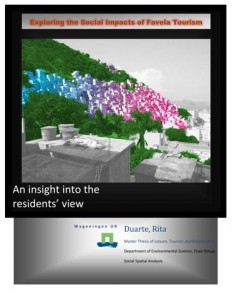 Yesterday a new book on slum tourism by one of the leading scholars of the subject, Bianca Freire-Medeiros was published. The book called “Touring Poverty” focuses on tourism in Rocinha, the most famous slum tourism destination in Latin America. It is a striking account and certainly a worthy read. You can find more information in the press release below
Yesterday a new book on slum tourism by one of the leading scholars of the subject, Bianca Freire-Medeiros was published. The book called “Touring Poverty” focuses on tourism in Rocinha, the most famous slum tourism destination in Latin America. It is a striking account and certainly a worthy read. You can find more information in the press release below
Touring Poverty (Routledge Advances in Sociology)
http://www.routledge.com/books/details/9780415596541/
Touring Poverty addresses a highly controversial practice: the transformation of impoverished neighborhoods into valued attractions for international tourists. In the megacities of the global South, selected and idealized aspects of poverty are being turned into a tourist commodity for consumption.
The book takes the reader on a journey through Rocinha, a neighbourhood in Rio de Janeiro which is advertised as “the largest favela in Latin America.” Bianca Freire-Medeiros presents interviews with tour operators, guides, tourists and dwellers to explore the vital questions raised by this kind of tourism. How and why do diverse social actors and institutions orchestrate, perform and consume touristic poverty? In the context of globalization and neoliberalism, what are the politics of selling and buying the social experience of cities, cultures and peoples?
With a full and sensitive exploration of the ethical debates surrounding the ‘saleof emotions’ elicited by the fi rst-hand contemplation of poverty, Touring Poverty is an innovative book that provokes the reader to think about the role played by tourism—and our role as tourists—within a context of growing poverty. It will be of interest to students of sociology, anthropology, ethnography and methodology, urban studies, tourism studies, mobility studies, development studies, politics and international relations.
Bianca Freire-Medeiros is Senior Lecturer in Sociology at the Center for Research and Documentation on Brazilian Contemporary History (CPDOC) at the Getulio Vargas Foundation in Rio de Janeiro, Brazil. She was a Research Fellow at the Center for Mobilities Research (CeMoRe) at Lancaster University.
PREFACE by Licia do Prado Valladares (Emeritus Professor of Sociology at the University of Lille 1 – France and Associate Researcher at IESP in Rio de Janeiro – Brazil)
